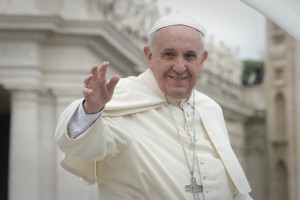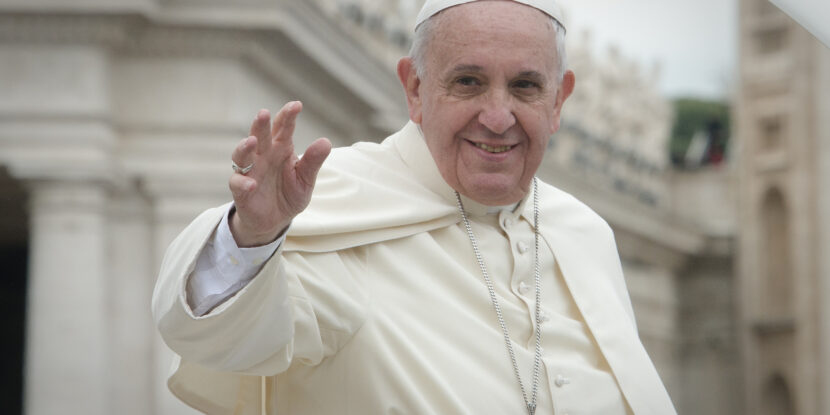
Amidst increasingly louder calls to separate religion and politics, the media frenzy surrounding Pope Francis’ visit to the United States shows just how far our culture is from this point.
Some are shocked that the head of the Catholic Church could hold so much influence over the country’s political process. But considering that Catholicism is the largest religious denomination in the United States, and that Catholics have picked the presidential winner 9 times out of the last 10 elections, it is a small wonder the 2016 Republican candidates will be listening closely to what the Pope has to say.
Yet whenever we try to politicize the Pope’s comments, it seems we can’t nail him down as Republican or Democrat. As the caricature goes, on abortion and gay marriage he’s a Republican, but on questions of immigration, the death penalty, climate change, and income inequality Pope Francis would definitely vote Democrat. And depending on how bad of a New York Times interpretation of the Pope’s comments you’ve been reading, you might be inclined to say he would even vote Democrat on gay marriage.
In the words of Des Moines Bishop Richard Pates, the situation has often left Catholics feeling “politically homeless.” So what is a conscientious Catholic voter to do? Or any conscientious voter, for that matter?
Rather than getting caught up in the speculations and laughable distortions of Pope Francis’ “political leanings,” there are two more level-headed approaches that both voters and GOP candidates should take to experience the #PopeinUS.
First, while we cannot control how a newspaper translates or interprets the Pope’s words, we should also try not to fall into the reader’s trap of media-hypocrisy. In other words, if you don’t trust The New York Times article on Pope Francis’ statements on homosexuality or marriage, why swallow their interpretation of the Pope’s encyclical? And for that matter, why turn to Rush Limbaugh for an exegesis when his information is drawn from The Washington Post?
Marco Rubio, a practicing Catholic, actually may have said it best. “He is a moral authority and as a moral authority is reminding us of our obligation to be good caretakers of the planet,” he responded when asked about Laudato Si’. “I’m a political leader and my job as a policymaker is to act in the common good.”
Read the encyclical and see that Pope Francis actually never advocates for any specific system of government or certain policy. The goal is to find whatever policy prescription actually protects the dignity of both humanity and the environment—in Rubio’s words, to act in the common good.
Which brings us to the second question of how to listen to the Pope—how should his words affect our stance on policy?
While there is no simple answer to this, one approach to incorporating the Pope’s teachings into policy is to work within the context of that which is near and dear to his heart: the family.
“We talk a lot about the future, about the kind of world we want to leave to our children, the kind of society we want for them,” Pope Francis recently told crowds in Cuba. “I believe that one possible answer lies in looking at yourselves: let us leave behind a world with families.”
Again, just this summer as Pope Francis told the Archdiocese of Rio de Janeiro’s radio station: “Not only would I say that the family is important for the evangelization of the new world. The family is important, and it is necessary for the survival of humanity. Without the family, the cultural survival of the human race would be at risk. The family, whether we like it or not, is the foundation.”
It is fitting that the Pope is coming to Philadelphia for the World Meeting of Families. But regardless of what Pope Francis speaks on during his visit to America, we can hope that it will prompt some soul searching—among Republicans and Democrats alike. Protecting the family is an approach to policy that any Republican should be able to stand on, especially as it is best accomplished through limited government.
The trap lies with those who attempt to portray the Pope as promoting a “liberal agenda.” But since when has respect and care for the poor, the immigrant, and the family become a liberal philosophy? Republicans should take a play from Pope Francis’ book and, rather than changing doctrine, emphasize the compassionate and family-centered aspects of it. Good policy goes nowhere using tired rhetoric.
Furthermore, this move is not impractical—Jeb Bush has shown this in his criticism of Trump’s immigration plan, telling CNN that “he wants everyone deported, which would tear family lives asunder.”
Concern for families is a key to promoting true republicanism. If the GOP can make a home for Catholics and other political refugees, everyone will be better off next November.
As Jeb Bush has said in expectation of the Pope’s visit, “here’s a man who comes with a gentle soul, and I think it might be really healthy for our country to hear someone speak the way he does.”
Anna Pfaff works for American Principles in Action.


